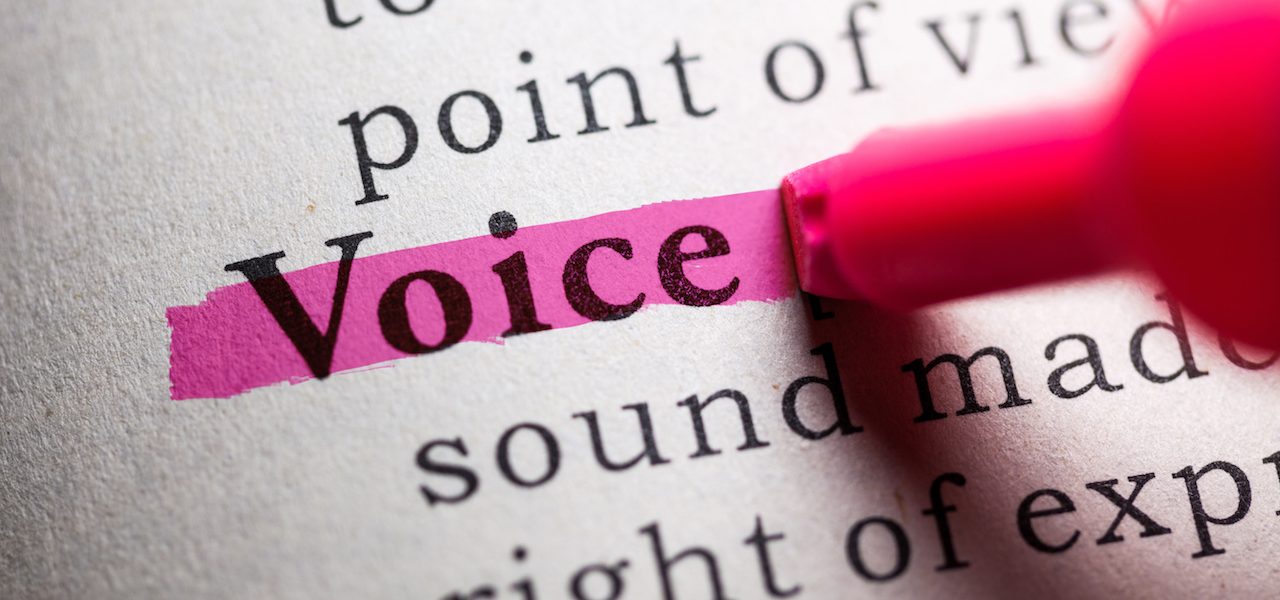WRITERS, STORYTELLERS, SINGERS, AND ARTISTS all have one thing in common: we want our work to be a unique expression of who we are as individuals. We want some aspect of our personality, our worldview, our inner selves or “souls” to be perceived in our art. The trick is learning to wield our art in a skilled way, letting unique aspects of our personality be experienced by our audiences. We do this, in part, by discovering what is different or unique about ourselves and then making choices about technique, tone, style, color, etc. that help our work to stand out as authentic, individual, and original. In other words, we bring out those qualities or elements that make our voice uniquely identifiable.
Voice is a term borrowed directly from the spoken word, a form of vocal expression. In writing, it is the who you hear in your imagination while reading or, conversely, the who your readers hear in their minds when reading your work.
Style and tone — terms that are sometimes used interchangeably or confused with voice — are elements of voice, just as they are aspects of spoken or sung expression. Voice is intrinsic to the singer or storyteller, a part of who he or she is as a person. When someone says, “I would recognize your work anywhere,” then you know it’s your voice they’re referring to.
On the other hand, tone is a tool a writer uses to communicate her message to her intended audience. For example, if a speaker wants to persuade her audience to a particular viewpoint, her tone must be enthusiastic and sincere, while providing facts to bolster her case. If she wants to evoke a particular mood within the reader, her tone (choice of words, syntax, and inflection) needs to be appropriate to move her audience in the intended direction.
Voice, however, is a quality that is intrinsic to the speaker, due to her physical characteristics — vocal chords, body size, lung capacity, etc. Some very talented storytellers, speakers, actors, and singers have the ability and training to use a wide range of vocal qualities. In some cases, they can even mimic someone else’s voice, so that it’s difficult to know who’s who. Similarly, a writer’s intrinsic voice is a result of biology and life experiences. And some writers are very good at using a wide range of vocal qualities to serve their purposes in telling a story.
Below is an Elements of Voice chart that I developed as a brainstorming activity to compare the qualities of voice used in vocal expressions to that of the writing voice.
Elements of Voice
|
Vocal/singing |
Written |
Questions for Analysis |
|
Timbre: the character or quality of a musical sound; resonance (deep, full, reverberating); part of who you are physically. |
The ability to evoke images rich in sensory detail; a universal experience that resonates with a particular audience; part of who you are psychically, your personality. |
If this writing were an instrument, what instrument would it be? Is the timbre of this writing deep, rich, full, light, airy, thin, or…? |
|
Tone |
Sense, mood, feeling, flavor, attitude, color, shade, light, dark. |
After reading a passage, what do you feel? Has the writer affected your mood in any way? If the passage were a color, what color or colors would it be? Who is the intended audience — adults, children, youth, women, men, people of a certain income or social class? |
|
Clarity, purity, easy to hear |
Clarity, easy to understand, certain, definite, transparent, pure, appropriate use of vocabulary |
Is the writing direct, easy to understand, or obscure in some way? What makes the message clear (or not)? |
|
Volume (quantity of power or sound) |
Proportion, balance |
Does the passage feel forceful? Is it quiet? Is it balanced? |
|
Tempo |
Pace |
What is the pace of this passage? Leisurely? Quick? Somewhere in between? Does it vary in tempo/pace throughout the selected passage? |
|
Expression; vocal inflection |
Expression: written inflection; unique perspective |
What phrases, metaphors, or similes reveal this author’s personal and/or unique way of seeing the world? |
|
Style: jazz, blues, classical, pop, etc. Incorporates techniques specific to certain types of music, with room for individual expression. |
Style: academic, prose, informal, formal, technical, etc. Incorporates techniques and writing mechanics specific to different types of writing and specific effects. |
How would you describe this piece’s style? Does the writer use this style frequently? Infrequently? Is style incorporated into the sense of this writer’s voice? Is the writer skilled in this writing style? |







Wow Amber….that’s a lot to think about. But I appreciate your comparing writing to singing. And the analysis I’ll be able to use. Thank you.
Ha, Sara – that’s me – always analyzing (and overthinking things). It’s part of my nature :-).
Thanks for this fascinating and far-reaching work. What a gift! And surely, a lot of work and research for you.
Your generosity goes way beyond the call of duty for sharing, I believe. Thanks again…I look forward to reviewing my writings while listening for sounds (the instruments), the colours I hope provide a kaleidoscope view, “the phrases, metaphors, or similes” that help me find my “real” voice and tones, and so much more. To absorb all you’ve offered will have me rereading endlessly. Thank you a million times over! Marjorie